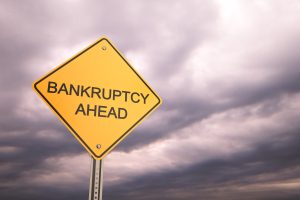Chicago Chapter 7 Bankruptcy Lawyer
 Chapter 7 bankruptcy is the most commonly-filed type of personal bankruptcy in the Chicago area. It is also known as Individual Liquidation, Liquidation Bankruptcy, or Straight Bankruptcy. Essentially, all of an individual’s unsecured debts are discharged in a Chapter 7 bankruptcy. The main reason to file Chapter 7 bankruptcy is to discharge debts such as credit card debt, medical debts, auto loans, and mortgage debt. Read more information about this type of bankruptcy or call our experienced Chicago Chapter 7 bankruptcy lawyers today.
Chapter 7 bankruptcy is the most commonly-filed type of personal bankruptcy in the Chicago area. It is also known as Individual Liquidation, Liquidation Bankruptcy, or Straight Bankruptcy. Essentially, all of an individual’s unsecured debts are discharged in a Chapter 7 bankruptcy. The main reason to file Chapter 7 bankruptcy is to discharge debts such as credit card debt, medical debts, auto loans, and mortgage debt. Read more information about this type of bankruptcy or call our experienced Chicago Chapter 7 bankruptcy lawyers today.
Given the option of filing either a Chapter 7 or a Chapter 13 bankruptcy, for most people a Chapter 7 bankruptcy is probably preferable. The reason is simple. A Chapter 7 bankruptcy usually discharges most types of consumer and household debts. Only some specific, non-dischargeable debts such as student loans, child support payments, and certain types of taxes are not covered by Chapter 7 bankruptcy. On the other hand, a Chapter 13 bankruptcy usually requires the repayment of debts within a three-to-five-year period.
Contrary to what people may have believed in the past, you do not have to be wealthy, formerly wealthy, or totally penniless either to file for bankruptcy. It all depends on your ability to meet your financial obligations. Since Chapter 7 bankruptcy is designed for average-income and low-income individuals, the high number of Chapter 7 bankruptcies has led to more restrictions, so qualifying for a Chapter 7 bankruptcy is not as easy as it used to be, contact our bankruptcy lawyers today.
Who Can Qualify For Chapter 7 Bankruptcy?
Not everyone who qualifies for a Chapter 7 bankruptcy should necessarily file for bankruptcy. Bankruptcy is not a fool-proof solution to all financial problems, and if it’s not approached with care, caution, and the advice of a good bankruptcy lawyer, a bankruptcy could end up causing you more financial harm than good. Never file for bankruptcy without first having an exhaustive consultation with an experienced bankruptcy lawyer. Eligibility for Chapter 7 bankruptcy is determined by a “means test.” An experienced Chicago Chapter 7 bankruptcy lawyer at the Bentz Holguin Law Firm can examine your financial position and then offer you practical advice regarding the means test, bankruptcy, and your other legal options if bankruptcy isn’t best for you.
The Means Test
Since 2005, the bankruptcy code has required a means test to determine if a bankruptcy candidate meets the basic requirements for a Chapter 7 bankruptcy. The Chapter 7 means test compares your income to the median income earned by workers in your state. The median income varies from one state to another, and generally speaking, almost everyone whose income is below their state’s median can qualify for Chapter 7 bankruptcy. However, if your income is above the state median, you may still qualify if you meet certain conditions. Your lawyer can determine if you meet the criteria for a Chapter 7 bankruptcy, but most high-income individuals will find it difficult to qualify for Chapter 7 bankruptcy under the requirements of the means test.
Chapter 7 bankruptcy is primarily for those individuals who do not have a regular monthly income or whose income is inadequate to pay their debts. If you believe that filing a Chapter 7 bankruptcy may be right for you, get the sound legal counsel you need and speak right away with an experienced Chicago Chapter 7 bankruptcy lawyer at the Bentz Holguin Law Firm. Once your eligibility is established, we can guide you through the process of filing a Chapter 7 bankruptcy.
Relief From Harassment
Constant harassment by creditors is not only emotionally taxing, but depending on the methods of collection, it could be a real source of embarrassment. Fortunately, when you file for Chapter 7 bankruptcy, an order for relief – called an automatic stay – goes into effect. The automatic stay will prevent creditors from harassing you about debts related to foreclosure, credit cards, repossession, payday loans, medical bills, and many other debts. Also, when you file for Chapter 7, much of the property you own – except for your exemptions – comes under the control of the bankruptcy court. You will not be able to sell or give away any of that property without the consent of the court. At the conclusion of the Chapter 7 process, your debts will be discharged by the court, except for non-dischargeable debts such as child support, tax debts, and student loans.
Contact Our Experienced Chicago Chapter 7 Bankruptcy Lawyers
Since 2005, the Chapter 7 bankruptcy process is longer, more expensive, and undeniably harder. The reason for this is simple: before 2005, the requirements for a Chapter 7 bankruptcy were less precise, and the system was being abused. Moreover, simply qualifying for a Chapter 7 bankruptcy is no guarantee that your bankruptcy petition will be approved. And even if you qualify, a Chapter 7 bankruptcy petition can be rejected if it isn’t properly filed. The law does not require you to be represented by a bankruptcy lawyer, but far too much is at risk to go it alone. If you’re in the Chicago area, and if you’re considering a Chapter 7 bankruptcy or if you need to learn more, speak at once with an experienced Chicago Chapter 7 bankruptcy lawyer at the Bentz Holguin Law Firm. Let us help you get a fresh financial start. Contact the Bentz Holguin Law Firm today by completing the form on this website’s contact page or by calling 312-647-2116.
